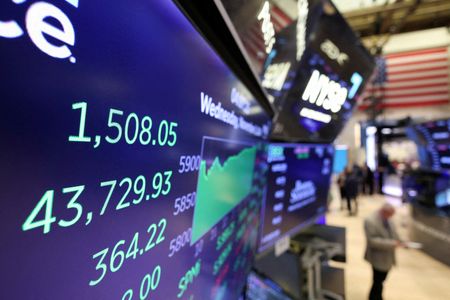By Shankar Ramakrishnan, Tommy Reggiori Wilkes and Mathieu Rosemain
NEW YORK/LONDON/PARIS (Reuters) -Investors are preparing to step up sales of their private credit holdings, as heightened market volatility unleashed by U.S. President Donald Trump’s trade wars forces them to find new ways to raise cash, fund managers and executives say.
Private credit, the name given to specialised lenders like Apollo Global Management, Ares Management and KKR that finance companies instead of banks, has boomed into a $1.5 trillion industry, drawing in big institutional investors like pension funds who invest in the funds that grant the loans.
While so-called “secondary sales” of stakes in private equity funds have soared amid a downturn in dealmaking, assets in private credit seldom change hands. This week’s dramatic market tumble may change that.
Investors are enquiring about shedding their private credit investments in the secondary market because they worry about being overly exposed to private assets as public markets fall in value and as the need for accessing cash in more volatile markets grows, executives say.
“We are hearing more and more from people seeking liquidity,” said Greg Ciesielski, a secondary fund manager at HarbourVest, referring to interest in selling private equity and credit exposure. “This is going to be a real inflection point (for private credit secondary activity),” he said.
On Tuesday, New York-based Pantheon announced it had raised $5.2 billion for a fund buying private credit stakes. Rakesh Jain, Pantheon’s global head of private credit, said secondary market opportunities were “among the most robust we have seen”.
Last week, Coller Capital, a secondaries manager, said it had acquired a $1.6 billion senior direct lending portfolio from U.S. insurer American National.
Negotiating a sale in the secondary market takes time, typically weeks, and is not the first place institutional investors turn to raise cash.
The scale and speed of market selloffs this week have seen some hedge funds rush to offload private debt positions, however, with several forced to unwind highly leveraged debt purchases after lenders hit them with margin calls.
“We were rung this week by an investment bank who said they have had to liquidate a hedge fund’s U.S. debt position to meet a capital call,” said Symon Drake-Brockman, co-founder of Pemberton, a European private credit manager.
Drake-Brockman said the debt was being offered at around 95 cents to the dollar, far from the panic selling seen during the 2020 COVID-19 crisis, when some banks offered underwritten loan positions at 65-70 cents.
Today’s market was offering “an opportunity to pick up quality credit at a discount to par, immediately booking an unrealized paper gain,” Drake-Brockman added.
Secondary market deal volumes hit a record $160 billion last year, driven by asset sales by leveraged buyout funds that could not exit investments through M&A and initial public offerings in volatile markets, and by their investors such as pension funds and insurers needing cash back faster than they could deliver.
Private equity transactions account for a much larger share of transactions. Ares has said an estimated 2-3% of private equity assets are traded in the secondary market, against less than 1% in private credit.
DENOMINATOR EFFECT
One big driver for investors to sell is the “denominator effect”, which leaves them with too much private market exposure when public stock and bond markets tank.
That’s because private assets are often marked to market, or revalued, monthly or quarterly, shielding investors from the volatility seen in public markets but leaving them overly exposed.
Fund managers caution that there has been little sign of distressed selling yet, with discounts being discussed in the range of 5-10% below par.
Trump’s blizzard of tariffs last week, and his partial u-turn this week, have hit confidence and analysts say it likely means tougher times ahead for economies and investors.
“It could be very negative for some of these limited partners (investors in private markets) because volatility is making it clear that liquidity is not going to come (through M&A and IPOs) in the short term so we are seeing interest to sell assets on the secondary market,” said Greg Fayvilevich, global head of Fitch Ratings’ fund and asset management group.
These dynamics are also likely to lift private equity secondary volumes further.
One New York-based secondary manager said it had been contacted by multiple U.S. endowment funds, which typically have little need to exit private equity investments but “whose financing methods have been turned upside down” by this week’s market turmoil.
(Reporting by Shankar Ramakrishnan, Tommy Reggiori Wilkes and Mathieu Rosemain; Additional reporting by Iain Withers; Editing by Nia Williams)











